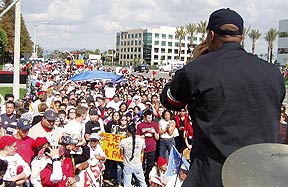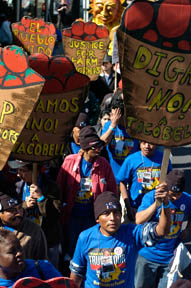| BACK TO TRUTH TOUR DAILY UPDATES BACK TO BOYCOTT HOME | TACO BELL TRUTH TOUR -- DAY THREE photos © Jacques-Jean Tiziou / www.jjtiziou.net 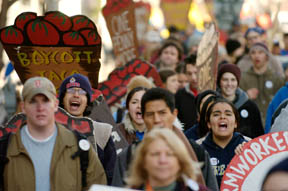
Hundreds of marchers hit the street, heading out on an 8-mile march that would take them through the city and diverse neighborhoods of Louisville on their way to Yum's headquarters.
| 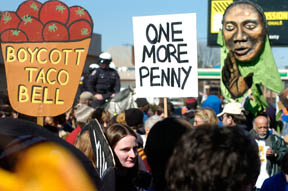
Protest signs and art declared the march's purpose in no uncertain terms (the puppet in this shot appears to be seconding the call for a penny more per pound -- a fairer price for tomatoes that would make a fairer wage for tomato pickers possible).
| 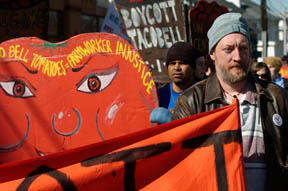
The issue of depressed farm prices is the link that has brought farmworkers from Immokalee into a strong new alliance with family farmers, like Ivor Chodowski (above) of Kentucky and the Community Farm Alliance (CFA), the organization he represented in the march. The concentration of corporate buying power in the food industry not only squeezes the life out of farmworkers at the bottom of the industry, but makes farming virtually impossible on a small or local scale, pushing family farmers out of the industry and favoring huge factory farms. The CIW will be joined by another small farm organization, the Family Farm Defenders, in Los Angeles in the march on Taco Bell.
| 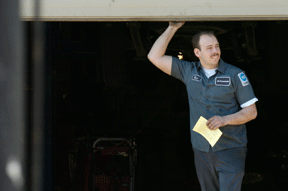
But the CIW's message doesn't just resonate with family farmers. People who work for a living tend to understand that something is wrong when you do one of this country's hardest jobs and yet can't put food on your own family's table.
Flyers handed out along the route explained the farmworkers' situation -- wages that haven't gone up in over 25 years, an average income of only $7,500 a year, overtime work without overtime pay, no health insurance, no sick leave, no pension -- helping make reactions along the route extremely supportive. | 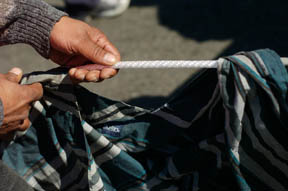
Midway through the march, the battle of symbols began in earnest. If the signs, chants, and flyers weren't enough, the workclothes -- stained green by picking -- made the point.
For weeks, CIW members brought their soiled clothes straight from the field to the CIW office, building a collection of hundreds of shirts and caps in a graphic demonstration of the reality -- the back-breaking work -- behind their products... | 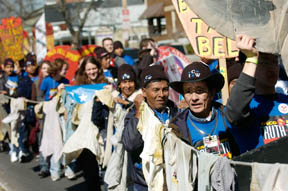
Following lunch, workers on the march strung their fellow workers' clothes on a line that stretched for blocks, launching a parade of Yum's dirty laundry through the streets of their home town.
The fast-food industry sells an image -- clean, convenient, happy meals, served in a brightly colored, plastic environment. The industry spends $3 billion annually to drive that image into our minds. But today, that facade was shattered. Left standing in its ruins -- the stark reality of super-exploitation, of millions of lives impoverished by the industry's unbridled drive for profits.
| 
The last few miles to Yum's offices were tough, but the fatigue was made immeasurably more bearable by the animation of our youngest marcher, Danielle, who led chants atop the sound truck that led us down the road.
| | 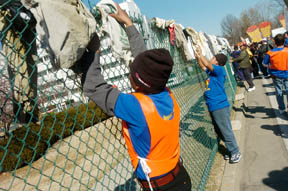
And finally we arrived... with a perfect fence on which to hang Yum's dirty laundry. If the number of Yum employees glued to their windows -- with a particularly large number on the upper floors peering out at the workers below -- was any indication, the gesture caused more than a bit of concern in the corporate giant's halls.
| 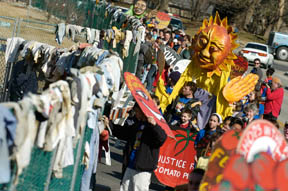
Round One in the Battle of Symbols goes to the workers: In this corner, wearing the gray pinstripe trunks... the cold, hard soul of corporate fast-food.
And in this corner, wearing sweat-stained trunks and workboots ... a human community moved by the belief that the tremendous riches generated by the industry can -- and must -- be more equitably distributed. Click on the link below to see how the workers ended the battle with an early knockout in the second round (Louisville was, before being home to Yum Brands, also Muhammed Ali's hometown, so the boxing metaphor has a special significance...) | | | |
